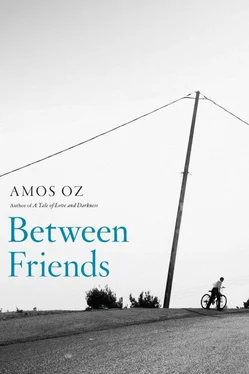They crossed the dining-hall square, which was illuminated by several streetlights, walked around the fountain, and as they were passing the sleeping kindergarten, Tsippora, the night guard at the children’s house, suddenly stopped them. She was about fifty-five, a wizened, angular woman who believed that the younger generation was destroying the kibbutz. Tsippora was surprised to see Dana Carni’s husband and Avner Sirota’s wife crossing the lawn together in the middle of the night. Concealing her surprise, Tsippora said, “I don’t want to bother you,” but asked nonetheless if they’d like to come into the children’s kitchen for a late-night snack. Nina said, “No, thank you,” and Yoav, embarrassed, apologized and began to mumble an explanation about some pressing matter that Nina simply had to clarify with him immediately. He knew that the words wouldn’t help. By morning, their names would fall straight out of Tsippora’s mouth into the mouths of Roni Shindlin and his gossipy friends at their table in the far corner of the dining hall: So guess who our night guard is guarding at night?
“We’re in a hurry to get something we need urgently from the office,” Yoav explained to Tsippora, and, when they were out of earshot, said to Nina, “They’ll be talking about us tomorrow, the whole kibbutz will be talking.”
“I don’t care, but I’m sorry for you.”
“And Avner?”
“Let him be jealous. I don’t care.”
“I’ll walk you back to the lecturers’ guest room. Sleep a few hours and tomorrow we’ll sit down and think about it again with a clear head.”
“My head has never been clearer than it is now.”
When they reached the office and Yoav turned on the light, he saw that the key to the lecturers’ guest room wasn’t hanging on the board. He remembered now that, in the afternoon, he’d given it to an air force officer who’d come to talk to the new recruits and was staying the night on Yekhat.
Yoav looked at Nina and Nina’s sharp green eyes looked back at him, as if to say: Surprise me. They stood close to each other in the office, which contained two desks with ordinary chairs, an upholstered bench, a metal cabinet full of files, a bare window, and on the wall, a detailed aerial photo of the kibbutz and the agricultural land surrounding it. Before looking away from Nina’s glance, Yoav noticed a fine wrinkle above her upper lip and thought it was a new one. And there were crow’s feet around her tired eyes. He took in the delicate line of her chin and her severely short-cropped blond hair. He thought she looked strong, firm, and resolute, definitely not in need of support. He was suddenly sorry that she wasn’t broken and crushed. He could barely restrain the urge to reach out and pull her body to his, to feel the weight of her head against his chest. He fought against the affection and longing that flooded him because he knew it wasn’t fatherly affection and, in fact, wasn’t affection at all.
“You can spend the night here, on this bench,” he said. “It’s not very comfortable but I don’t have any other place for you at the moment. Would you like me to make you a cup of tea? We have a kettle and cups here and even a few biscuits. I’ll go and find you a blanket and a pillow.”
“Thank you. There’s no need for a blanket and a pillow. I’m not going to sleep. I’m not tired. Just let me sit here till morning.”
Yoav turned on the electric heater and the kettle, left, and came back ten minutes later carrying a pillow and two woolen blankets. He found Nina pouring herself a cup of tea without asking if he wanted one, too. He stood at the office door for a while, hesitating, his thin face reddening because he wanted to stay but knew he had to go, knew that before he went, he should tell her something else, but didn’t know what. Nina touched his shoulder with the tips of her fingers and said, “Thank you.” Then she said, “Don’t worry. A little before six in the morning, before anyone comes, I’ll leave to go to work in the apiary as usual. I’ll make sure everything is in order here.”
And as if reading his mind, she added, “No one will know that I spent the night here.”
Yoav hesitated, shrugged, and said, “Okay. So that’s it for the time being.” And added, “Good night.” Then, “Still, you should try to sleep a little.”
He closed the door gently and, outside, pulled up his coat collar, strode across the soldiers’ living area onto the muddy dirt path that led to the chicken coop to set the brooder house temperature, it being already one in the morning. On the side of the path, he noticed a wet bush here and there, and a broken crate. He was sorry he didn’t have a flashlight. The cold was more biting and the wind had intensified. Yoav thought about the darkness of the orchards on winter nights, and he had a strong, momentary urge to get up and leave everything, abandon his guard duty, walk to the orchards, and wander alone in the dark among the now-bare fruit trees. Someone was waiting for him somewhere, or so he felt; someone had been waiting patiently for years, knowing that no matter how long Yoav delayed, he would ultimately come. One night, he would get up and finally go. But where? That he didn’t know, and was, in fact, a bit frightened of finding out.
On his way back from the chicken coop, he walked the length of the perimeter fence and checked the gate to the kibbutz, his collar pulled up, wool hat pulled down over his ears, and the rifle hanging on a strap from his shoulder. When he reached the children’s house, he went inside to cover his twins and brush their foreheads with a kiss, then went from bed to bed, covering the other children, too. Outside, he headed for his house, took his shoes off at the door, and tiptoed inside to turn off the small bedside radio his wife kept on to lull her to sleep. Dana was asleep on her back, her dark curls spread softly on the pillow. Very gently, he straightened the blanket and, as if to apologize, he stroked a curl with the tips of his fingers and tiptoed out.
He wandered along the fence for about half an hour, and when he noticed that the bulbs in two streetlamps had burned out, he made a mental note to tell Nahum Asherov, the electrician, about it tomorrow. At almost two o’clock, a gibbous moon peeked out of the clouds, but still it began to drizzle. Yoav went to the children’s kitchen for a cup of coffee with Tsippora, the night guard. He placed his rifle carefully on the floor but didn’t take off his coat or hat, and sat down all bundled up. Tsippora poured black coffee, spread two slices of bread with margarine and jam, and said gloomily, “It won’t end well, Yoav, this thing of yours with Nina Sirota. Listen to what I’m telling you.”
“I have no thing with Nina Sirota. She just had an urgent problem and I had to help her solve it. Here, the secretary is still the secretary in the middle of the night.”
“It won’t end well,” Tsippora insisted, “a married man suddenly walking around with another man’s wife in the middle of the night.”
“Tsippora. Listen to me for a minute. If you’d just keep it to yourself, please, and not talk about me and Nina tomorrow, you could help solve a delicate family problem. You’re a responsible person and you must surely understand that you have to be discreet because this is a personal family problem.”
“Whose family problem? Yours or hers? Or both of yours?”
“Tsippora, please, I’m asking you. Let it go.”
But when he left the children’s kitchen, he knew that his words would not help and tomorrow he and Nina would become the kibbutz subject of the day. He’d have to explain the night’s events to Dana, who’d known for a long time that Yoav had once been a little in love with Nina. It would be complicated and messy.
Читать дальше












